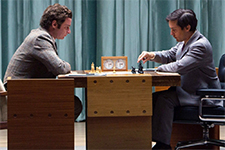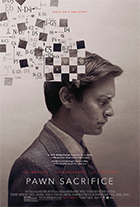Pawn Sacrifice
|  By the end of Edward Zwick’s Pawn Sacrifice, we can be sure of two things: (1) American chess master and world champion Bobby Fischer was one of the greatest to ever play the game and (2) he was extremely paranoid. Like many films about geniuses (see, for example, Ron Howard’s Oscar winner A Beautiful Mind and Joe Wright’s The Soloist), Pawn Sacrifice presents extreme genius and mental illness as being so fundamentally intertwined that you can’t see where one begins and the other ends. Perhaps it is our would-be egalitarian cultural mindset (or our intensive anti-intellectualism) that explains why we like to see the most gifted of people crippled in some way, whether physically or mentally, and Pawn Sacrifice plays right into all of those expectations, beginning the film with Bobby (Tobey Maguire), in the midst of his internationally renowned 24-match tournament against the Soviet champion Boris Spassky (Liev Schreiber) in Iceland, tearing apart his room looking for listening devices. The film begins and ends with his paranoia; it becomes the film’s reigning theme, and it wears you down. By the end of Edward Zwick’s Pawn Sacrifice, we can be sure of two things: (1) American chess master and world champion Bobby Fischer was one of the greatest to ever play the game and (2) he was extremely paranoid. Like many films about geniuses (see, for example, Ron Howard’s Oscar winner A Beautiful Mind and Joe Wright’s The Soloist), Pawn Sacrifice presents extreme genius and mental illness as being so fundamentally intertwined that you can’t see where one begins and the other ends. Perhaps it is our would-be egalitarian cultural mindset (or our intensive anti-intellectualism) that explains why we like to see the most gifted of people crippled in some way, whether physically or mentally, and Pawn Sacrifice plays right into all of those expectations, beginning the film with Bobby (Tobey Maguire), in the midst of his internationally renowned 24-match tournament against the Soviet champion Boris Spassky (Liev Schreiber) in Iceland, tearing apart his room looking for listening devices. The film begins and ends with his paranoia; it becomes the film’s reigning theme, and it wears you down.The screenplay by Steven Knight (Dirty Pretty Things, Eastern Promises) takes us back into Bobby’s childhood, where we see him in conflict with his mother (Robin Weigert), a leftwing political activist who was being tracked by the FBI (which the film posits as the seed of Bobby’s lifelong paranoia). His obsession with chess is already well formed at this point, and throughout the film nothing matters to him but the pieces on the board. He wins championship after championship, and with each victory his ambition grows until he sets on the notion of defeating the Soviet champion Spassky. The Soviets, having cultivated chess masters for years, had intellectual bragging rights, and Bobby made it his goal to defeat them. Bobby is aided by Bill Lombardy (Peter Sarsgaard), a chess master-turned-Catholic priest, and Paul Marshall (Michael Stuhlbarg), a lawyer who helps secure funding and encourages his one-man battle against Soviet chess dominance. Paul, an avid patriot, has connections in Washington, where the Nixon White House sees Bobby’s preeminence as an opportunity to demonstrate American superiority over the communists on a world stage (the same basic drive that put Americans on the moon). Both Bill and Paul find themselves struggling to work with Bobby, whose paranoia and often unreasonable, if not downright bizarre, demands suggest someone whose mind is falling apart or who has become so hyper-focused on the game of chess that he can’t bother with rationality and social decorum away from the board. Tobey Maguire’s performance plays to his inherent strengths as an actor who exudes a withdrawn, intense internal world, but also challenges him in conveying Bobby’s braggadocio, which he does with impressive conceit. Maguire plays Bobby in determined fashion, his Brooklyn accent betraying his humble, working-class origins, thus making him the perfect representative of self-educated American street grit defeating highly refined Soviet cultivation. But, with every potential victory there is the potential of disaster, as Bobby’s mental instability, which Maguire depicts with increasingly wide eyes and angry outbursts, threatens to outweigh the genius for the game that has made him internationally famous. Unfortunately, the film’s focus on Bobby’s mental issues ultimately detracts from the more intriguing aspects of the story, particularly the Cold War tension between the Soviets and the Americans. Director Edward Zwick, who has made some great films (1989’s Glory) and some very good ones (1994’s Legends of the Fall, 2008’s Defiance), but often works with too heavy a hand, tries to balance the global and the internal, but it never quite works. He also strives to impart visual interest in a game that is almost entirely static, and most of his conceits (including animated moves on a board representing Bobby’s thoughts) don’t really work. There are bits and pieces that fascinate, including the stoic Soviets’ response to Beverly Hills and its outrageous material comforts and the strange nature of competitive chess played before a live audience, but then we’re back inside Bobby’s ravaged worldview, with exaggerated noises on the soundtrack and extreme close-ups of his eyes and ears to replicate his attention-rattled obsession with noise (at one point a match with Spassky grinds to a halt because he is so distracted by the whirring of the cameras). Watching Pawn Sacrifice, I was reminded of another, infinitely superior film about a chess prodigy: Steven Zaillian’s Searching for Bobby Fischer (1993). That film’s opening credits sequence, which summarizes virtually everything that happens in Pawn Sacrifice via grainy still images and newsreel footage set against the innocent, whispered voice-over narration of the film’s young protagonist, creates an infinitely more effective aura of mystery and intrigue, setting Bobby up as an enigma that can never be solved (Zaillian’s film also had the beautiful audacity to contrast genius with normality, suggesting that a chess prodigy might also be happy playing baseball and that his troubles stem not from himself, but from the expectations of those around him). Pawn Sacrifice tries to do something similar, but it is too literal and heavy-handed in its treatment, and Bobby emerges as yet another tortured genius who fell prey to his own demons, as if there is no other alternative. Copyright ©2015 James Kendrick Thoughts? E-mail James Kendrick All images copyright © Bleecker Street Media |
Overall Rating: 
 (2)
(2)


